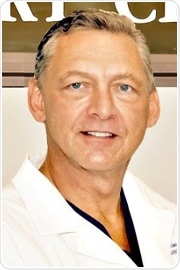I have been interested in the brain early on, even before high school, I was fascinated by the brain, I read books on it. I enjoyed looking at it in biology class and wanted a career in it.
One of my friends in high school, his father was a neurosurgeon. He worked at Columbia Presbyterian, the neurological institute in New York City. He actually invited me to watch surgery. That was it, I was like a deer in the headlights, I was really jacked up about it. Afterward, I knew that's what I wanted to do.
What are the main responsibilities in your current job?
Well, the main responsibility I have is making sure that I recommend the appropriate treatment for a patient and choose the right surgery that is beneficial to the patient and has minimal risk. So it is all about balancing risk with reward, that's our main duty.
What does a typical day look like for you?
During my typical day, I make rounds at the hospital, I then either go to surgery or go to my clinic where I will do consults on patients that are referred to me, for example, from other doctors or neurologists, people with either back or neck problems or brain problems.
Then, I will see them and offer them options. So, basically rounds, surgery, and/or clinic, that's my day.
What is the most rewarding part about your job?
You often, especially when you deal with difficult brain problems, get to feel like a hero on a regular basis. You have a real impact on people's lives, especially when they have something life-threatening, and you have the ability to save their life.
That is an addiction I'll never get over. It's a fantastic feeling that I don't think you can get in any other job.
What do you find most challenging about working in neurosurgery?
Sometimes the surgeries are very delicate and it's easy to injure a patient and then having to deal with what happens afterward.
Unlike the UK, our society in the United States is very lawsuit happy. So, even if you give your best effort, and it doesn't work out the way you expected it to, you can wind up getting sued, which is a very, very unpleasant experience.
Throughout your career, what has been your proudest achievement?
I think my proudest achievement was when I first started in practice, maybe one or two years after my training, there was this well-known nurse who had a very complicated brain aneurism that bled and I was assigned to care for her. I forget how it happened.
But, I did an operation and removed the aneurism and she woke up perfectly and I was the hero of the hospital. Everybody was like bowing down to me after that, it was quite an amazing save really.
What has been the most exciting project that you have worked on?
I did an article that summarized, in one of our peer-review journals, the techniques of minimally invasive spine surgery. It went through several manuscript revisions, and then eventually it got published, and I got a lot of good comments from the editors. So, that was exciting.
What advice would you give to people who want to pursue a career in neurosurgery?
You have to have a passion for it. You have to have the ability to do some magnificent things with your hands. You have to be able to really love the job because it can be a horrendous lifestyle.
Brain injuries don't occur at five o'clock in the afternoon typically, they're in the middle of the night. Sometimes people get into arguments when they're drinking which is often late, car accidents happen around the clock with brain injuries.
The devotion required to be a neurosurgeon is pretty, pretty incredible and the lifestyle is quite difficult. You have to be understanding of that and have a passion for it because it's not an easy job, but it's a rewarding one.
Is there anything else about your career that you would like to share with our readers?
The neurosurgeon is really at the top of the food chain in medicine. Everybody looks to the neurosurgeon, has the final say, and it's a really important job. It has been an honor to do this for the last 31 years and I've enjoyed it.
However, it takes a toll. I don't have a lot of dark hair anymore, a lot of it's gray. But it is a good job. And it's not for everybody, but if you manage to get into a training program and become a neurosurgeon, it's an amazing lifestyle.
Where can readers find more information?
Please provide links to any materials that may be relevant to our audience.
About Dr. Jeffrey H. Oppenheimer
Dr. Oppenheimer is a Board-Certified Neurosurgeon who currently performs both spine surgeries and injections. He obtained his BA cum laude from Cornell University. Following this, Dr. Oppenheimer obtained an MS in Biophysiology and Physics with distinction and an MD from the Georgetown University School of Medicine. He completed a 6-year Residency at the largest hospital in the USA, The University of Southern California- Los Angeles County Medical Center.
During his 31-year career as a physician, he has written peer-reviewed journal articles and a chapter in a Neurosurgery textbook. In addition, he has spoken on national television including Emergency 911, NBC News, and the Sean Hannity Radio program. He serves as assistant professor of Neurosurgery at the University of Central Florida College. Dr. Oppenheimer has obtained additional certification by the American Board of Independent Medical Examiners.